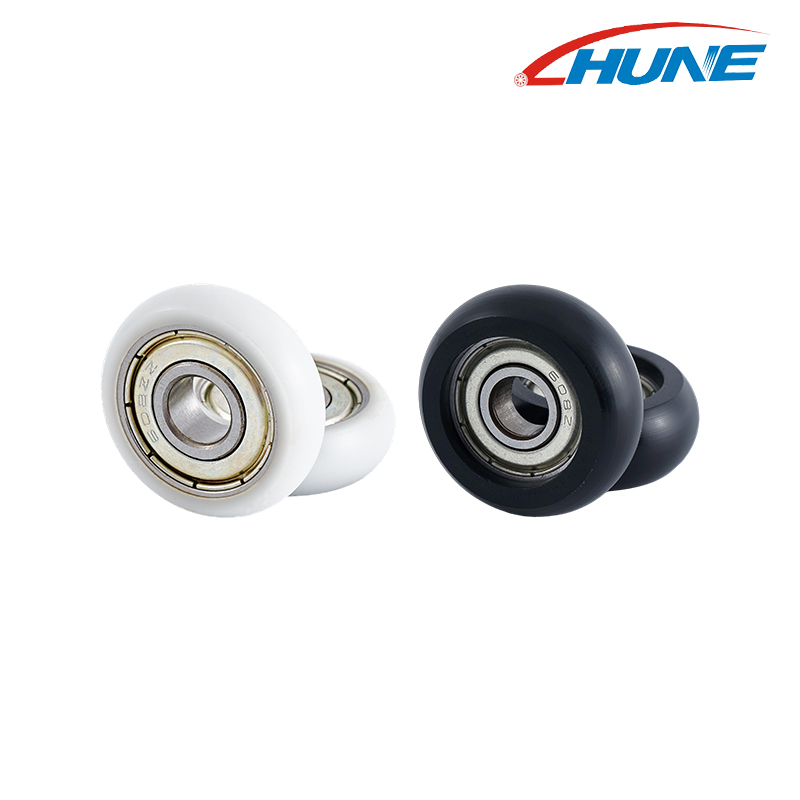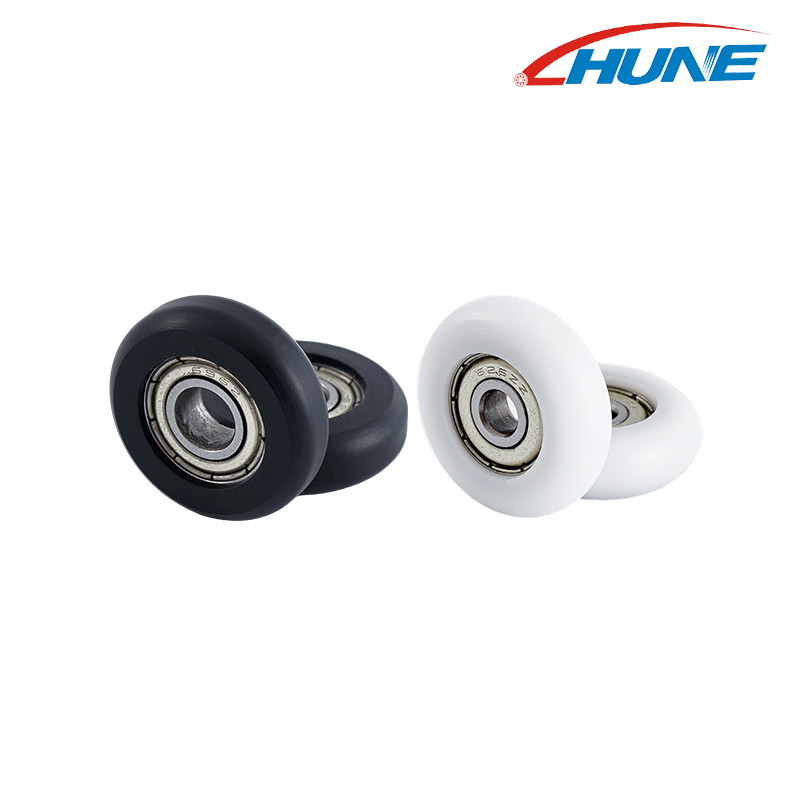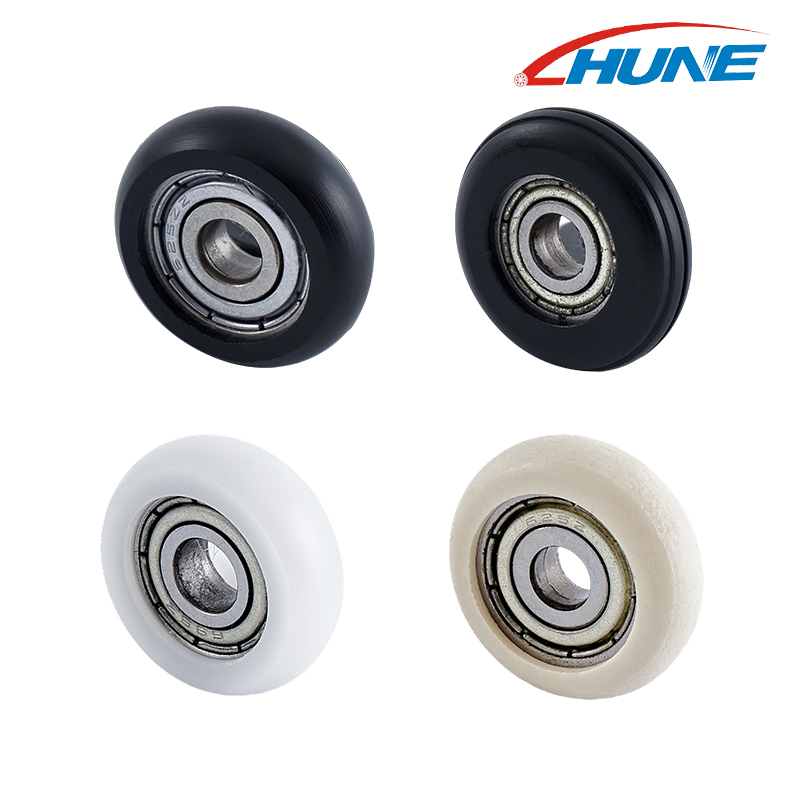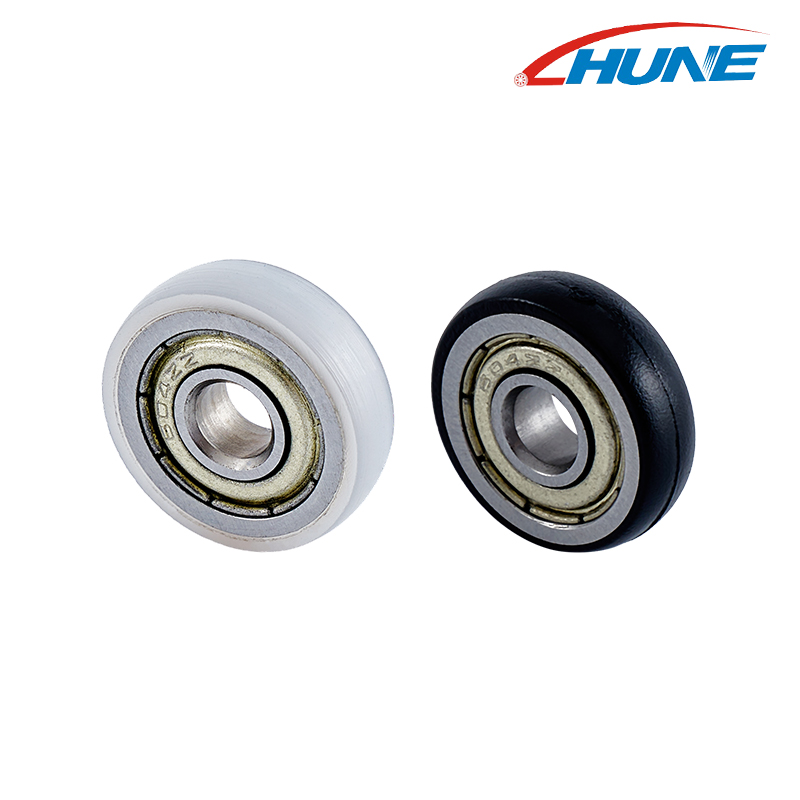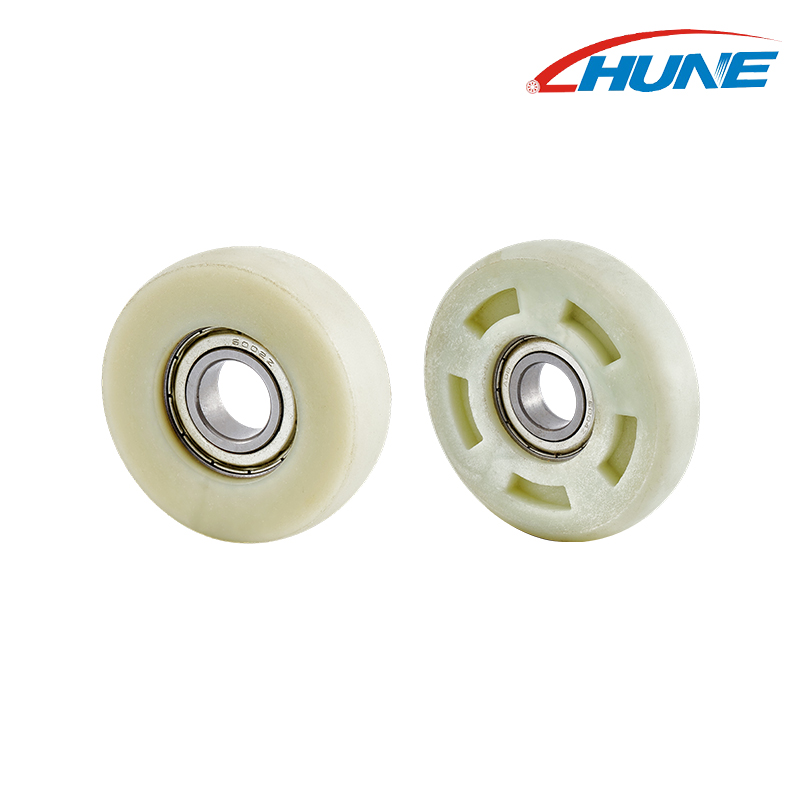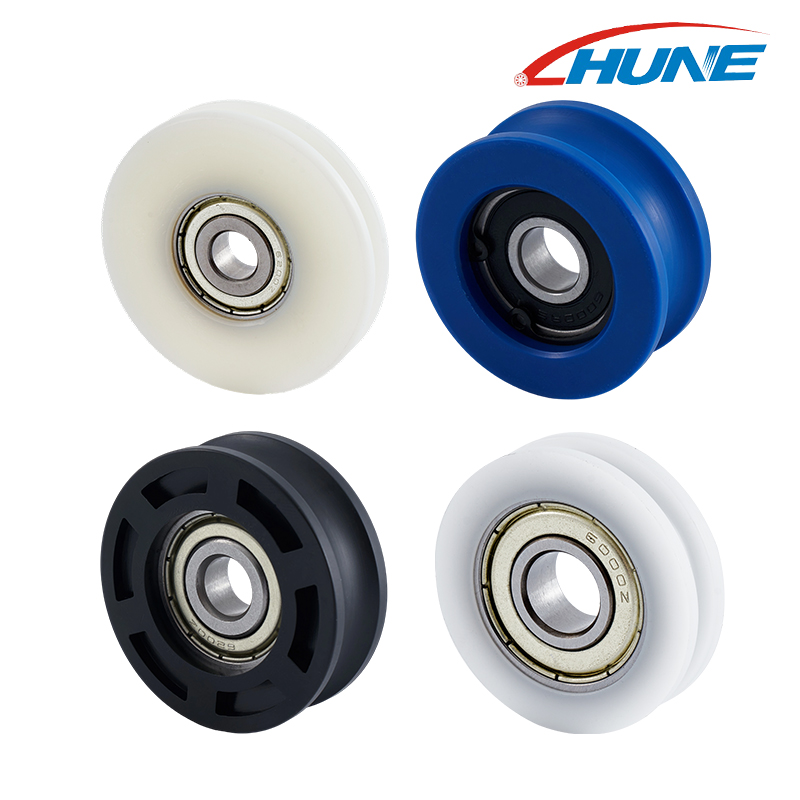Nylon pulley wheels are widely used in a variety of mechanical systems, particularly in sliding applications. These pulleys provide efficient, quiet, and smooth motion, making them ideal for systems where noise reduction, durability, and performance are critical.
What Are Nylon Pulley Wheels?
Nylon pulley wheels are mechanical components made from high-strength nylon, a type of thermoplastic material known for its lightweight, flexible, and durable properties. These wheels have a groove designed to hold belts or cables securely, ensuring smooth operation in applications such as sliding doors, windows, conveyor systems, and fitness equipment. Nylon's low-friction surface ensures a quiet and efficient operation, while its resistance to wear and tear helps extend the life of the pulley system.
Material Properties of Nylon: Strength, Flexibility, Low Friction
- Strength
- Nylon is a high-strength material that provides excellent support under moderate to light loads. It can handle continuous stress without cracking or breaking, making it perfect for sliding systems that undergo repeated movements.
- Flexibility
- Nylon offers great flexibility, which allows the pulley to bend without breaking, making it ideal for curved tracks or systems that need some degree of movement. This flexibility also contributes to its ability to absorb shock and vibration, which helps reduce wear on both the pulley and the system it operates.
- Low Friction
- One of the key benefits of nylon pulleys is their low-friction properties. This feature reduces the amount of resistance between the pulley and the belt or cable, resulting in quieter operation and less wear on the components. The smooth surface helps minimize the need for lubrication, further improving ease of maintenance and reducing operating costs.
Key Benefits of Nylon Pulley Wheels
- 1. Lightweight Design
- Reduced system load: Nylon pulleys are lightweight, which reduces the overall weight of the system, helping to improve the efficiency of the entire mechanism.
- Easier installation: Their low weight also makes them easier to install and maintain compared to heavier materials like steel or aluminum.
- 2. Low Friction for Smooth Operation
- Minimized wear and tear: Nylon's low friction properties help reduce friction between the pulley and the belt or rope, resulting in less wear over time.
- Efficient performance: This friction reduction also leads to better energy efficiency, as less energy is lost to heat during operation.
- 3. Quiet Operation
- Ideal for noise-sensitive environments: Nylon pulleys are known for their quiet operation, making them the preferred choice in residential or office applications where noise reduction is a priority.
- Less vibration: The material helps absorb vibrations, contributing to smoother movement and a quieter overall system.
- 4. Durability and Wear Resistance
- Long-lasting performance: Nylon is a highly durable material, making it capable of withstanding repeated use without cracking or breaking.
- Ideal for high-frequency systems: The wear resistance of nylon ensures that the pulley wheel retains its shape and functionality, even after extensive use.
- 5. Corrosion and Chemical Resistance
- Ideal for damp or harsh environments: Nylon pulleys are naturally resistant to moisture and rust, making them well-suited for use in humid or outdoor environments.
- Chemical resistance: Nylon also offers resistance to most chemicals, ensuring that the pulley wheels remain intact in industrial settings where exposure to various substances is common.
Key Benefits of Nylon Pulley Wheels
|
Feature |
Benefits |
|
Lightweight Design |
Reduces load, improving efficiency. Easy installation and maintenance. |
|
Low Friction |
Minimizes wear. Enhances energy efficiency. |
|
Quiet Operation |
Ideal for noise-sensitive areas. Absorbs vibrations for smoother movement. |
|
Durability & Wear Resistance |
Long-lasting and withstands frequent use. Retains shape under high-frequency use. |
|
Corrosion & Chemical Resistance |
Resistant to moisture, rust, and chemicals. Ideal for harsh environments. |
Applications of Nylon Pulley Wheels in Lightweight Sliding Systems
Nylon pulley wheels are widely used in lightweight sliding systems due to their smooth operation, quiet performance, and durability. Their unique material properties make them suitable for a wide range of applications, particularly where low friction, long-lasting performance, and minimal noise are key requirements.
Residential Sliding Doors
Nylon pulley wheels are extensively used in residential sliding doors, providing a quiet, smooth, and effortless sliding experience. Whether it’s a patio door, closet door, or sliding partition, nylon pulleys are designed to optimize door movement while minimizing wear and tear. The low-friction properties of nylon reduce the need for regular lubrication, while its durability ensures that the door will operate smoothly for years to come.
- Key Benefits:
- Smooth motion: Nylon's low friction ensures the door slides effortlessly with minimal resistance.
- Noise reduction: The smooth material significantly reduces noise, ideal for quiet living spaces.
- Low maintenance: The non-corrosive nature of nylon reduces the need for frequent upkeep.
- Durability: Nylon is highly resistant to wear, ensuring the pulleys perform reliably over time, even with frequent use.
- Applications:
- Sliding glass doors in patios or balconies
- Sliding closet doors in bedrooms or closets
- Interior room partitions in modern homes or offices
Cabinet and Furniture Hardware
Nylon pulleys are widely used in cabinet doors, drawers, and other furniture systems that require smooth sliding and ease of use. These pulleys help create frictionless movement for drawers, cabinets, and other furniture pieces that experience regular motion. With their resilience to wear and tear, nylon pulleys ensure long-lasting performance, reducing the need for repairs or replacements.
- Key Benefits:
- Smooth sliding: Enables easy opening and closing with minimal effort.
- Quiet operation: Nylon pulleys absorb vibrations and reduce noise, making them ideal for living room furniture or office cabinets.
- Durability: They can withstand constant movement without showing signs of wear, maintaining a fresh appearance and functionality over time.
- No rusting: Unlike metal, nylon doesn't corrode or rust, ensuring long-term performance in humid environments like kitchens or bathrooms.
- Applications:
- Drawer slides in kitchen or office cabinets
- Pull-out shelving systems in kitchens or closets
- Sliding wardrobe doors or storage units in furniture design
Small Conveyor or Automated Systems
Nylon pulleys are also highly effective in small conveyor systems and automated machinery where smooth movement of light to medium loads is essential. The low-friction properties of nylon reduce the resistance that usually slows down conveyor systems, helping to maintain consistent speeds and increase efficiency. The pulleys are well-suited for light-duty conveyors used in manufacturing, assembly lines, or material handling systems.
- Key Benefits:
- Efficient material handling: Nylon pulleys allow the conveyor belt to move smoothly, facilitating faster product transportation in automated processes.
- Low wear and tear: The non-abrasive nature of nylon helps maintain the integrity of both the pulley and the belt over time.
- Minimal noise: Ideal for environments where quiet operation is essential, such as in packaging or food production lines.
- Corrosion resistance: Ideal for food processing, pharmaceuticals, or other industries where exposure to moisture or chemicals is a concern.
- Applications:
- Small automated assembly lines in factories
- Conveyor belts for light goods or packaged products
- Material handling systems in warehouses or logistics
- Food industry conveyor systems where hygiene and low noise are important
|
Application |
Benefits |
Specific Uses |
|
Residential Sliding Doors |
Smooth motion, quiet operation, low maintenance, durable |
Patio/closet sliding doors, interior partitions |
|
Cabinet & Furniture Hardware |
Smooth sliding, quiet, durable, rust-free |
Drawer slides, pull-out shelves, sliding wardrobe doors |
|
Small Conveyor & Automated Systems |
Efficient material handling, low wear, quiet, corrosion-resistant |
Light-duty conveyor belts, automated assembly lines, food or pharmaceutical handling systems |
Load Requirements and Noise Reduction Benefits of Nylon Pulley Wheels
Nylon pulley wheels are known for their excellent performance in lightweight applications, offering a unique set of benefits in terms of both load capacity and noise reduction. These pulleys are widely used in systems where smooth motion, durability, and low operational noise are key priorities. Below, we will explore the load requirements and noise reduction benefits of nylon pulleys, comparing them with other materials like metal and rubber.
Load Requirements
Suitability for Lightweight Applications
Nylon pulley wheels are particularly well-suited for lightweight applications due to their low density and resilience. They are ideal for systems that handle moderate to light loads, offering a cost-effective solution without sacrificing performance. Their strength-to-weight ratio allows them to efficiently manage smaller-scale movements while maintaining reliable operation.
- Key Benefits:
- Efficient movement for low to medium-duty systems
- Lightweight design minimizes strain on the overall system
- Long lifespan due to resistance to wear and tear from light loads
- Cost-effective for systems requiring lower load capacities
Comparison with Metal and Rubber Pulley Wheels
When compared with metal and rubber pulleys, nylon offers certain distinct advantages for light-duty applications:
- Nylon vs. Metal: Metal pulleys are generally used for high-load systems where strength is the main concern. However, they are often heavier and more prone to corrosion and rust. Nylon, being lighter and resistant to corrosion, is a better choice for systems where weight and long-term performance are critical in less demanding environments.
- Nylon vs. Rubber: Rubber pulleys are excellent for shock absorption and noise reduction, but they tend to wear out faster and can be less durable over time. In contrast, nylon pulleys maintain their performance longer in moderate load applications while offering low friction and improved efficiency.
Noise Reduction Benefits
How Nylon Minimizes Operational Noise
One of the standout advantages of nylon pulley wheels is their ability to minimize operational noise. The low friction properties of nylon help reduce vibration and resistance within the system, leading to smoother operation and quieter performance. This feature is especially important in applications where noise control is a priority, such as in residential, office, or commercial environments.
- Key Benefits:
- Reduced friction leads to less noise during operation
- Absorbs vibrations effectively, contributing to quieter movement
- Ideal for noise-sensitive environments such as homes, offices, and public spaces
- Minimal need for lubrication reduces the chances of mechanical noise caused by friction
Applications in Quiet Environments
Nylon pulleys are particularly suited for environments where quiet operation is essential. Their ability to reduce noise makes them an excellent choice for sliding doors, automated systems, furniture hardware, and small conveyor systems used in areas like homes, offices, and commercial buildings.
- Key Applications:
- Sliding doors in homes or offices where smooth, quiet operation is critical
- Automated machinery in warehouses or retail environments where low noise levels are important
- Furniture hardware like cabinets and drawers where silent movement is preferred
- Conveyor systems in food processing or packaging facilities where noise reduction is necessary for worker comfort and product safety
Noise Reduction Benefits and Durability of Nylon Pulley Wheels
Nylon pulley wheels offer a range of benefits, particularly when it comes to noise reduction and durability. These features make nylon pulleys a top choice for systems requiring smooth, quiet operation and long-lasting performance. In this section, we explore how nylon pulleys minimize operational noise and their resistance to wear, making them ideal for light-duty systems and sliding applications.
Noise Reduction Benefits
How Nylon Minimizes Operational Noise
Nylon is an excellent material for minimizing operational noise in mechanical systems. Due to its low friction properties, nylon pulley wheels reduce the amount of resistance between the pulley and the belt or cable, which translates to quieter operation. The smooth surface of nylon helps absorb vibrations and prevents them from transferring through the system, ensuring that noise levels remain low even during high-frequency use.
- Key Benefits:
- Low friction: Reduces resistance between moving parts, leading to quieter operation.
- Vibration damping: Nylon helps absorb and dissipate vibrations that can cause noise in the system.
- Smooth movement: The material allows for smoother, quieter sliding and rotation, minimizing mechanical noise.
Applications in Quiet Environments
Because of its noise-reducing properties, nylon pulleys are ideal for use in environments where quiet operation is a priority. These applications include residential settings, offices, and commercial spaces, where noise can be a distraction or a safety concern.
- Key Applications:
- Sliding doors and windows: In homes and offices, where smooth and quiet operation is essential.
- Automated systems: In retail or warehouse environments, where minimizing noise improves employee comfort and productivity.
- Furniture hardware: In office furniture or home cabinetry, where quiet, effortless sliding is necessary.
- Conveyor systems: In food processing, pharmaceutical, or packaging industries, where reducing operational noise ensures a more comfortable working environment.
Durability and Wear Resistance
Nylon's Resistance to Abrasion and Friction
One of the most significant advantages of nylon pulley wheels is their durability. Nylon is naturally resistant to abrasion and friction, which makes it an ideal material for systems that undergo frequent movement. These pulleys are built to withstand repeated use without breaking down, maintaining consistent performance over time. This wear resistance helps reduce the frequency of replacements, making nylon pulleys a cost-effective choice for long-term use.
- Key Benefits:
- Wear resistance: Nylon resists abrasion, preventing the pulley surface from becoming rough or damaged over time.
- Low friction: Nylon's smooth surface reduces wear on both the pulley and the belt or cable, helping both components last longer.
- Long-lasting performance: Nylon pulleys maintain their functionality even under constant movement, minimizing downtime and maintenance costs.
Longevity in Sliding Systems
Nylon's durability and wear resistance make it particularly well-suited for sliding systems. Whether it’s a sliding door, conveyor system, or furniture hardware, nylon pulleys can handle the constant motion and light to medium load typically seen in these systems. This durability ensures that the system continues to function optimally for extended periods, providing long-term reliability.
- Key Benefits:
- Prolonged lifespan: Nylon pulleys last longer than many other materials due to their wear resistance and low friction.
- High load capacity: Nylon can handle moderate to light loads without compromising the integrity of the system.
- Cost savings: Reduced wear and tear means less frequent maintenance or replacement, saving money over time.
Smooth Operation, Low Friction, and Environmental Considerations of Nylon Pulley Wheels
Nylon pulley wheels are widely known for their smooth operation, low friction, and environmental resistance. These properties make nylon pulleys the ideal choice for many sliding systems, ensuring both efficiency and longevity. In this section, we will explore how nylon contributes to effortless sliding, energy efficiency, and its resistance to environmental factors such as moisture, chemicals, and temperature variations.
Smooth Operation and Low Friction
How Nylon Ensures Effortless Sliding
Nylon pulleys are specifically designed for smooth and effortless movement. The material's naturally low friction properties enable the pulley to operate with minimal resistance, allowing for easy, smooth sliding of belts, cables, or ropes. This smoothness is particularly important in systems where continuous or frequent motion is required. Nylon reduces the effort needed for operation, minimizing strain on motors and increasing overall system efficiency.
- Key Benefits:
- Effortless movement: The low friction of nylon ensures smooth sliding motion without excessive resistance, reducing mechanical strain.
- Reduced energy consumption: Less friction means less energy is wasted on overcoming resistance, leading to improved energy efficiency for the entire system.
- Increased lifespan: Reduced friction results in less wear and tear on both the pulleys and associated components, leading to longer-lasting systems.
Impact on Energy Efficiency
The low friction inherent in nylon pulley wheels contributes significantly to energy efficiency. In systems that rely on mechanical movement, friction is one of the primary causes of energy loss. Nylon's ability to reduce this friction means that less energy is required to drive the system, resulting in lower operational costs and reduced energy consumption.
- Key Benefits:
- Lower operational costs due to reduced energy usage.
- Efficient systems that require less input energy to maintain the same performance.
- Sustainability: Nylon's energy-saving properties contribute to greener operations by lowering overall energy demand.
Environmental Considerations
Resistance to Moisture, Chemicals, and Temperature Variations
Nylon is highly resistant to environmental factors, making it an excellent choice for use in both indoor and outdoor applications. It maintains its strength and functionality in the face of moisture, chemicals, and extreme temperatures. This resistance ensures that nylon pulleys can operate reliably in challenging environments, from damp warehouses to outdoor machinery exposed to the elements.
- Key Benefits:
- Moisture resistance: Nylon does not absorb water, making it ideal for use in humid or wet environments like food processing or outdoor applications.
- Chemical resistance: Nylon is resistant to oils, greases, and cleaning agents, which makes it well-suited for industrial applications where exposure to chemicals is common.
- Temperature tolerance: Nylon maintains its structural integrity in a wide range of temperatures, from freezing cold to high heat, making it adaptable for extreme environments.
Ideal Scenarios for Indoor vs. Outdoor Use
Indoor Use: Nylon pulleys are perfect for indoor sliding systems, including residential doors, office furniture, and small conveyor systems. Their resistance to moisture and chemicals ensures that they perform well in controlled environments, such as warehouses or manufacturing plants.
Outdoor Use: Nylon is also suitable for outdoor applications, particularly in marine environments, where exposure to saltwater, humidity, and varying temperatures is common. Its resistance to corrosion and durability make it ideal for outdoor machinery, garden equipment, and marine rigging systems.
- Key Benefits:
- Indoor Use: Provides smooth, quiet operation and long-lasting performance in environments like homes, offices, and factories.
- Outdoor Use: Offers excellent resistance to environmental stressors such as rain, sunlight, and saltwater, making it suitable for rugged outdoor applications.
Cost-Effectiveness and Expert Tips for Selecting Nylon Pulley Wheels
Nylon pulley wheels are not only known for their reliable performance and low maintenance but also for their cost-effectiveness in various applications. Choosing the right nylon pulley can help reduce long-term operating costs, improve system efficiency, and minimize downtime. In this section, we’ll explore the cost-effectiveness of nylon pulleys compared to other materials and provide expert tips for selecting the right pulley for your needs.
Cost-Effectiveness
Low Maintenance and Replacement Advantages
One of the key advantages of nylon pulley wheels is their low maintenance and long lifespan, which directly contributes to their cost-effectiveness. Nylon pulleys are highly resistant to wear and tear, meaning they need fewer repairs and replacements than other materials, such as metal or rubber. The low friction properties of nylon help reduce abrasion and heat generation, which results in less frequent lubrication and maintenance.
- Key Benefits:
- Reduced maintenance costs: Nylon pulleys are durable and require minimal upkeep, leading to lower operational costs over time.
- Fewer replacements: Their resistance to wear ensures that replacement rates are significantly lower than with other materials.
- Longer service life: With less wear and tear, nylon pulleys can perform reliably for years, extending the overall lifetime of the system.
These advantages make nylon pulleys particularly beneficial for systems where continuous operation is critical and reducing downtime is a priority.
Comparison with Other Materials
When compared to metal and rubber pulleys, nylon pulleys often offer a more cost-effective solution in the long run.
- Nylon vs. Metal: While metal pulleys offer greater strength, they are prone to rust, corrosion, and wear in certain environments, which can increase maintenance and replacement costs. In contrast, nylon pulleys resist corrosion and can withstand lighter loads over longer periods, reducing the need for frequent replacements or repairs.
- Nylon vs. Rubber: Rubber pulleys are known for their shock absorption and noise reduction qualities but tend to degrade quicker than nylon due to abrasion and heat buildup. Nylon pulleys offer longer-lasting performance with fewer signs of wear, making them a more cost-effective choice for light to medium-duty applications.
Nylon's advantage lies in its balance of performance and durability, offering long-term savings through reduced maintenance, lower replacement costs, and enhanced system efficiency.
Expert Tips for Selection
Choosing the Right Size and Type of Nylon Pulley
Selecting the right nylon pulley involves understanding the requirements of your specific application. Here are some key factors to consider when choosing the size and type of nylon pulley:
- Load capacity: Ensure that the nylon pulley can handle the load requirements of your system. Larger pulleys may be needed for heavier loads, while smaller pulleys can efficiently handle lighter loads.
- Groove type: Select the appropriate groove type for your system. Nylon pulleys come in various groove profiles like V-grooves, U-grooves, and flat grooves, each designed to work with specific belt or cable configurations. Make sure the groove type matches your system’s needs to ensure smooth and efficient operation.
- Bearing type: Choose pulleys with the right bearing setup for your system. Options like ball bearings, sleeve bearings, or self-lubricating bearings offer different performance levels, depending on the application.
Installation and Maintenance Best Practices
To ensure long-lasting performance and optimal operation of your nylon pulleys, it's important to follow proper installation and maintenance practices:
- Proper installation: Ensure that the pulley is aligned correctly and mounted securely in the system. Misalignment can cause unnecessary friction and wear, reducing the pulley's lifespan.
- Lubrication: While nylon pulleys are low-maintenance, it’s important to apply lubrication to reduce friction in high-load or high-speed applications. Be sure to use the appropriate lubricant based on the pulley material and the environment.
- Regular inspection: Check pulleys periodically for signs of wear, cracks, or other damage. Regular maintenance will help you catch problems early and avoid unexpected downtime.
- Cleaning: Keep the pulley system clean from dirt, debris, and contaminants. These particles can cause unnecessary friction and lead to premature wear on both the pulleys and the belt or cable.
if you are looking for a material that offers low maintenance, reduced noise, and long-lasting performance, Hune nylon pulley wheels should be your go-to solution. Their cost-effectiveness, combined with their efficiency and reliability, makes them the ideal choice for any system where smooth, quiet motion and minimal downtime are key priorities.
Why Nylon Pulley Wheels Are a Great Choice for Your Sliding Systems
Choosing nylon pulley wheels for your sliding systems offers a balance of efficiency, durability, and cost-effectiveness. These pulleys are particularly suited for systems that require low friction, smooth operation, and quiet performance over long periods.
Key Benefits of Nylon Pulley Wheels:
- Low Friction: Nylon pulleys help ensure smooth, easy movement, minimizing wear and tear on the system.
- Reduced Noise: The material naturally reduces noise, making it ideal for environments where quiet operation is important.
- Durability: Nylon's wear-resistant properties ensure a long-lasting performance, reducing the need for frequent replacements.
- Cost-Effective: With fewer maintenance needs and longer lifespans, nylon pulleys offer a more affordable solution over time.
When you compare nylon to other materials like metal or rubber, it becomes clear why it's a great choice for lightweight sliding systems. Nylon pulleys provide reliable performance without the added maintenance costs or shorter lifespan that can come with other materials.
With Hune, you can expect long-lasting performance that reduces maintenance costs while maintaining smooth, quiet operation. Whether you're working on a residential or industrial system, Hune's nylon pulleys provide a solution that balances quality and affordability.
FAQ - Nylon Pulley Wheels
- Why Are Nylon Pulley Wheels Preferred in Lightweight Applications?
- Nylon's low density makes it ideal for lightweight applications. It offers excellent performance in systems where reducing weight is critical, such as in sliding doors, windows, and automated machinery.
-
What Are the Key Advantages of Using Nylon Pulley Wheels Over Metal Pulleys?
- Nylon pulleys are quieter, lighter, and provide better noise reduction due to their low friction properties. Additionally, nylon is more resistant to corrosion and requires less maintenance than metal pulleys.
-
Can Nylon Pulley Wheels Be Used in Outdoor Applications?
- Yes, nylon is resistant to moisture and environmental factors such as humidity and UV radiation, making it suitable for outdoor sliding systems, patio doors, and even marine environments.
-
Are Nylon Pulley Wheels Resistant to Corrosion?
- Yes, nylon is highly resistant to corrosion, especially in humid or moist environments, unlike metal pulleys that may rust. This property makes nylon a great choice for outdoor and wet environments.
-
Do Nylon Pulley Wheels Require Lubrication?
- Nylon pulleys often require less lubrication than metal counterparts because of their low friction nature. In some applications, they may be self-lubricating, but occasional lubrication may be necessary for optimal performance.
-
How Do Nylon Pulley Wheels Reduce Noise in Systems?
- Nylon's inherent low friction and smooth surface reduce the noise generated during operation. This makes nylon pulley wheels ideal for residential sliding doors and other applications where noise reduction is essential.
-
What Types of Bearings Are Used with Nylon Pulley Wheels?
- Nylon pulley wheels can be equipped with different types of bearings, including ball bearings, roller bearings, or sleeve bearings, depending on the application's speed, load, and performance requirements.
-
What Are the Maintenance Requirements for Nylon Pulley Wheels?
- Nylon pulleys require minimal maintenance, but periodic inspections for wear, alignment, and cleaning are recommended. Ensure that the pulleys are aligned properly and check for any damage to the grooves or bearings.
-
Are Nylon Pulley Wheels Suitable for Conveyor Systems?
- Yes, nylon pulleys are frequently used in light-to-medium-duty conveyor systems, especially in situations where noise reduction and low friction are required. They provide smooth, reliable operation in these environments.
-
What Are the Common Applications of Nylon Pulley Wheels?
- Common applications include sliding doors, automated machinery, conveyors, fitness equipment, windows, and garage doors. Nylon's quiet, low-maintenance, and cost-effective properties make it ideal for a wide range of light-duty systems.
-
Are Nylon Pulley Wheels Environmentally Friendly?
- Nylon is a relatively eco-friendly material compared to metals like steel and aluminum. It can be recycled, and its manufacturing process generally has a lower carbon footprint. Some manufacturers also offer nylon pulleys made from recycled materials for even more sustainable options.






 English
English  Español
Español  日本語
日本語 